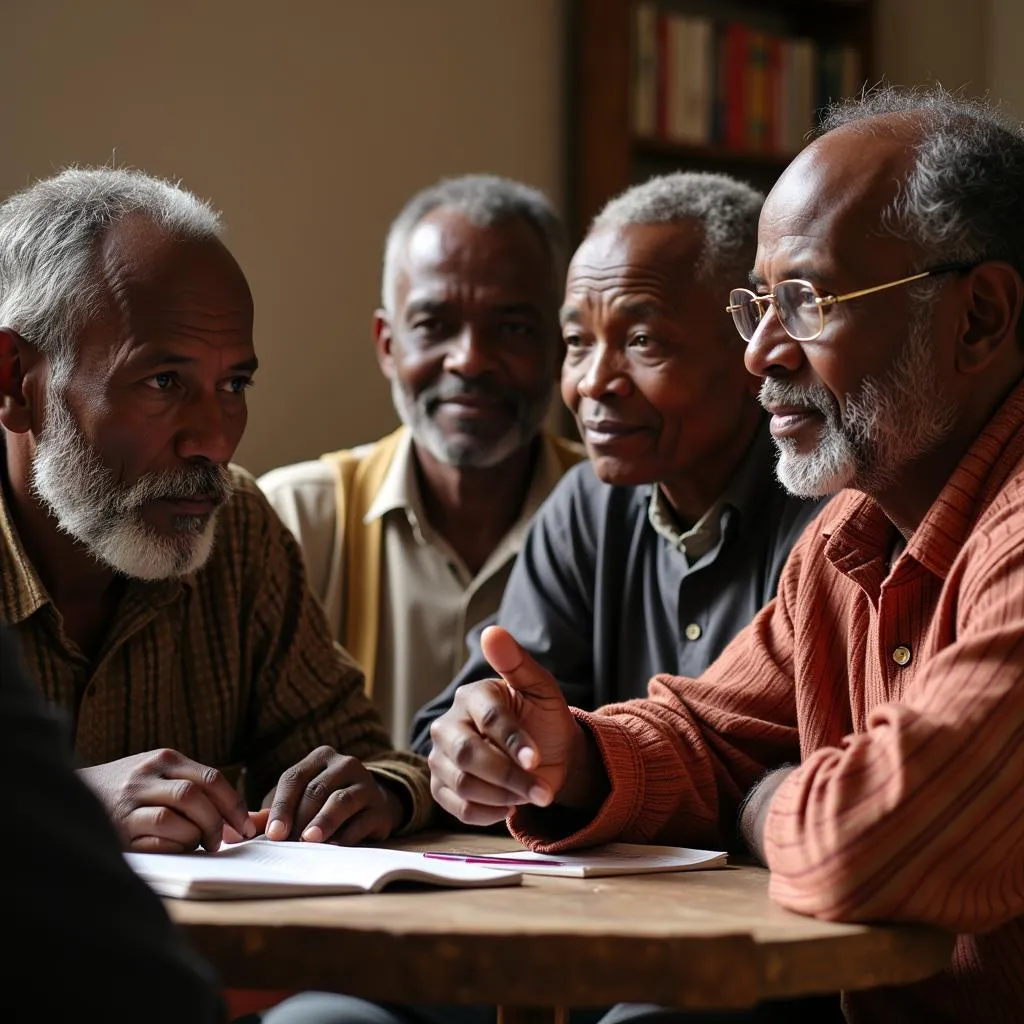Navigating Tradition: Understanding African Customary Law
African customary law is a fascinating and complex system of legal practices that has governed social, economic, and political life across the African continent for centuries. Often passed down orally through generations, it encompasses a vast array of customs, traditions, and beliefs that vary significantly between different ethnic groups and regions. While modern legal systems have become increasingly prevalent, African customary law continues to hold immense significance for millions of people, influencing their daily lives and shaping their understanding of justice and social order.
The Enduring Influence of African Customary Law
 African elders discussing customary law
African elders discussing customary law
One of the key characteristics of African customary law is its emphasis on consensus and community involvement. Disputes are often resolved through mediation and reconciliation, with elders and respected community leaders playing a crucial role in facilitating dialogue and finding amicable solutions. This emphasis on restorative justice stands in stark contrast to the adversarial nature of many formal legal systems, where the focus is often on determining guilt and punishment.
Another defining aspect of African customary law is its close connection to the land and ancestral spirits. Land is not merely viewed as a commodity to be owned but rather as a sacred inheritance that connects present generations to their ancestors and future descendants. This spiritual dimension is also reflected in the importance attached to rituals, ceremonies, and the observance of traditional beliefs, which are often deeply intertwined with legal practices and decision-making processes.
The Intersection of Custom and Modernity
The arrival of colonialism and the subsequent imposition of European legal systems brought about significant changes to the African legal landscape. Customary law was often marginalized, dismissed as primitive or incompatible with modern legal principles. However, despite the challenges posed by colonialism and globalization, African customary law has demonstrated remarkable resilience and adaptability.
In many African countries, customary law is formally recognized as a source of law, operating alongside state-sanctioned legal frameworks. This recognition has led to the development of “mixed” legal systems, where customary and modern laws coexist and interact in complex ways.
Addressing the Challenges of African Customary Law
The integration of customary law into modern legal systems has not been without its complexities. One significant challenge lies in reconciling customary practices with universal human rights principles. For instance, certain customary practices, such as female genital mutilation or inheritance laws that discriminate against women, have been subject to criticism for violating fundamental human rights.
 African women empowered by legal reforms
African women empowered by legal reforms
Another challenge arises from the dynamic nature of customary law itself. As societies evolve and new challenges emerge, customary practices must adapt to remain relevant and effective. This process of adaptation requires careful consideration to ensure that the core values and principles of customary law are preserved while also addressing contemporary issues.
The Future of African Customary Law: Balancing Tradition and Progress
African customary law stands at a crossroads, navigating the complexities of a rapidly changing world. Preserving its rich cultural heritage while addressing contemporary challenges requires a delicate balancing act. Education and awareness-raising initiatives are crucial to fostering greater understanding and appreciation of customary law, both within Africa and globally.
By promoting dialogue, research, and legal reforms that recognize the value and relevance of customary practices, it is possible to create a future where African customary law continues to play a vital role in shaping a just and equitable society.
FAQs about African Customary Law
1. What are some examples of African customary law in practice?
Examples include traditional marriage ceremonies, inheritance customs, land tenure systems, and dispute resolution mechanisms involving elders or community leaders.
2. How does African customary law view the concept of justice?
Justice in African customary law often emphasizes reconciliation, restitution, and the restoration of social harmony, rather than solely focusing on punishment.
3. Is African customary law static and unchanging?
No, customary law is dynamic and constantly evolving to adapt to changing social norms, values, and circumstances.
4. What role do elders play in African customary law?
Elders are highly respected figures who often serve as custodians of customary knowledge, mediators in disputes, and advisors on legal matters.
5. What are some of the challenges facing African customary law today?
Challenges include ensuring its compatibility with human rights, addressing gender inequality within certain practices, and adapting to the complexities of modern society.
For further insights into African customary law, we encourage you to explore these related articles:
- Learn about the significance of African clan structures.
- Delve deeper into the intricacies of African customary marriage.
- Understand the role of African chiefstanding traditional leadership.
If you’re seeking comprehensive resources on this topic, be sure to check out this insightful African customary law pdf. And for a captivating account of the legal profession in Africa, don’t miss “A Life Like Law: South African Lawyer.”
Need help navigating the complexities of African customary law? We’re here to assist you. Contact us today at +255768904061 or kaka.mag@gmail.com. You can also visit us at Mbarali DC Mawindi, Kangaga, Tanzania. Our dedicated team is available 24/7 to provide support and guidance.


